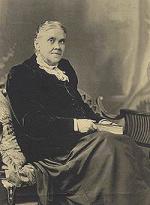Disable ads!
Ellen G. White
Part of a series on Seventh-day Adventism Background Christianity Protestantism Anabaptist Restorationism Wesleyan/Arminian Pietism Millerites Great Disappointment Theology 28 Fundamental Beliefs Pillars Sabbath Second Advent Baptism by Immersion Conditional Immortality Historicism Premillennialism Investigative judgment Remnant Three Angels' Messages End times Organization General Conference Divisions East-Central Africa Euro-Africa Euro-Asia Inter-American North American Northern Asia-Pacific Southern Africa-Indian Ocean South American South Pacific Southern Asia Southern Asia-Pacific Trans-European West-Central Africa Literature Adventist Review El Centinela Signs of the Times List of Ellen White writings List of periodicals Adventist Archives Service Pathfinders Adventurers Medical Cadet Corps Adventist Education Secondary Schools Higher Education Hospitals Humanitarianism Media Outreach Adventist World Radio It Is Written Hope Channel The Voice of Prophecy People Ellen G. White James White Joseph Bates J. N. Andrews Uriah Smith J. H. Kellogg F. D. Nichol M. L. Andreasen George Vandeman H. M. S. Richards Edward Heppenstall Herbert E. Douglass Morris Venden Samuele Bacchiocchi George Knight List of Seventh-day Adventists Other Adventists Seventh-day Adventist portal v t e Ellen Gould White (née Harmon; November 26, 1827 – July 16, 1915) was a prolific author and an American Christian pioneer. She, along with other Sabbatarian Adventist leaders, such as Joseph Bates and her husband James White, formed what is now known as the Seventh-day Adventist Church. Ellen G. White was named among 100 Most Significant Americans in the Smithsonian magazine in a acknowledgement on Ellen White’s influence on religion. Ellen White reported to her fellow believers her visionary experiences. James White, and others of the Adventist pioneers, viewed these experiences as the Biblical gift of prophecy as outlined in Revelation 12:17 and Revelation 19:10 which describe the testimony of Jesus as the "spirit of prophecy." Her Conflict of the Ages series of writings endeavor to showcase the hand of God in Biblical and Christian church history. This cosmic conflict, referred to as the "Great Controversy theme", is foundational to the development of Seventh-day Adventist theology. White was considered a somewhat controversial figure. Her reports of visionary experiences and use of other sources in her writings comprise much of the controversy. She received her first vision soon after the Millerite Great Disappointment. Historian Randall Balmer has described her as "one of the more important and colorful figures in the history of American religion". Walter Martin described her as "one of the most fascinating and controversial personages ever to appear upon the horizon of religious history." Arthur L. White, her grandson and biographer, writes that Ellen G. White is the most translated female non-fiction author in the history of literature, as well as the most translated American non-fiction author of either gender. Her writings covered creationism, agriculture, theology, evangelism, Christian lifestyle, education and health. She advocated vegetarianism. She promoted and was instrumental in the establishment of schools and medical centers. During her lifetime she wrote more than 5,000 periodical articles and 40 books. Today, including compilations from her 100,000 pages of manuscript, more than 100 titles are available in English. Some of her most famous books include The Desire of Ages, The Great Controversy and Steps to Christ. Her work on successful Christian living, Steps to Christ, has been published in more than 140 languages.
 Read more on wikipedia.org Read more on wikipedia.org
 All quotes by Ellen G. White All quotes by Ellen G. White
 Edit Edit
|

|
|
|
|
|
Background photo by Giuliana
|